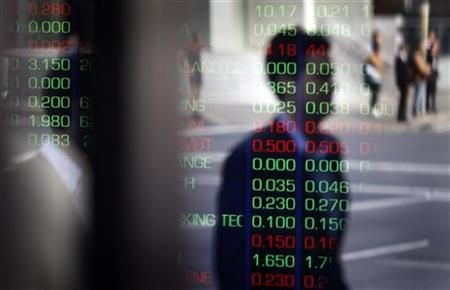Asian stocks slump on recession fears, gold jumps

Asian stocks tumbled as much as 4 percent on Friday on growing fears that the U.S. economy was sliding into recession and as some European lenders faced short-term funding strains, raising fears of a systemic banking crisis on the continent.
Gold hit a fresh high of $1,833.81 an ounce as investors rushed into the safe-haven after heavy losses on U.S. and European markets overnight.
S&P 500 futures fell 0.6 percent in Asia, adding to a slump of nearly 4.5 percent overnight and pointing to more losses for battered Western markets later in the day.
European equities suffered their biggest daily slide in 2-½ years on Thursday.
In Asia on Friday, Japan's Nikkei 225 index fell 2.1 percent while stocks elsewhere in Asia as measured by MSCI lost a similar amount. But pressure on some markets with more exposure to hi-tech shares was more intense, with Korea's KOSPI tumbling 4 percent and Taiwan down nearly 3 percent.
A drop in factory activity in the U.S. Mid-Atlantic region to the lowest level since March 2009 stunned investors, as the data from the Philadelphia Federal Reserve Bank is viewed as a forward-looking indicator of national manufacturing.
Investors have been spooked by these data. They are now focusing on next week's data such as U.S. GDP, said Yumi Nishimura, a senior market analyst at Daiwa Securities.
Retail investors may buy defensive stocks on dips, but such buying may not have an impact on the overall index.
An unexpected fall in existing U.S. home sales in July and a greater-than-expected rise in new claims for jobless benefits in the latest week also added to fears that the U.S. economic recovery could stall and it slide into recession.
In Europe, renewed fears that the euro zone debt crisis could infect the region's financial system put pressure on short-term funding markets, forcing some European banks to pay higher rates for U.S. dollar loans and reviving memories of the dark days of late 2009 after the collapse of U.S. investment bank Lehman Brothers as funding dried up.
The U.S dollar held modest gains in Asia, with the dollar index that tracks its performance against a basket of major currencies, up 0.2 percent as investors piled into the safety of U.S. Treasuries despite falling yields.
U.S crude oil futures fell 1.66 percent over fears energy demand will be hit by slower economic growth.
© Copyright Thomson Reuters {{Year}}. All rights reserved.





















